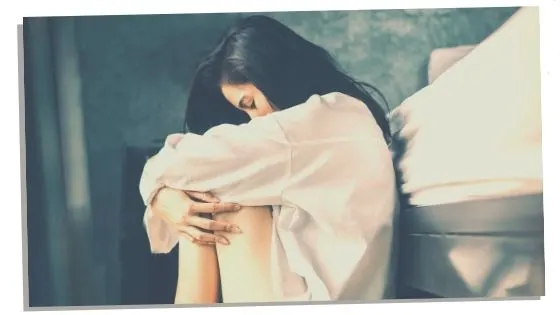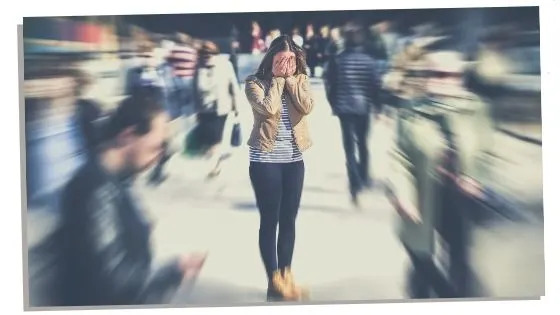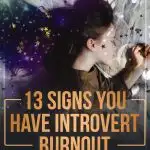In the continuously evolving culture that we are part of it can often seem like being an introvert is a more challenging lifestyle preference to embody.
Socializing, constant connection, and stimulation seem to prevail unless as introverts we intentionally create a life that allows us to have the alone time that we so desire.
Living in a world with constant coercion to socialize and having to constantly interact with people is the basis of most learning and work environments and so in a culture or environment that values extroversion, we introverts can easily experience burnout.
Within this article, we will learn more about introvert burnout, including 10 signs that will help you to confirm if you have introvert burnout and some of the ways that you can recover from introvert burnout.
What Is Introvert Burnout?
To fully understanding introvert burnout we can start by gaining an understanding of each of these terms, introvert and burnout:
An introvert is a person who identifies themselves as enjoying and thriving through spending time alone or in quiet and calm environments.
Introverts will regard their alone time as essential and prioritize time with themselves as a key element of their lifestyle.
Burnout is an experience that one can have where completing a specific task or participating in certain activities becomes stressful and exhausting.
It can cause physical and mental effects such as fatigue and detachment.
Now we can consider what is introvert burnout? Introvert burnout is essentially when a person who enjoys and requires a quiet and solitary lifestyle becomes overextended or overexerted in social situations or activities and so the introvert temporarily exhausts his/her ability and will to be in social situations.
Severe introvert burnout can even cause an introvert's alone time to be mentally and physically stressful but alone time is all the more necessary so that one can recoup and re-energize; taking the time and necessary embodiment to heal burnout.
What Does Introvert Burnout Feel Like?

Introvert burnout can feel like your social battery or abilities are exhausted.
It can feel like a large amount of your energy has been drained.
It can feel as if your energy is finite and almost completely depleted.
It can manifest at a different level of intensity for different individuals, depending on how severely you have violated your boundaries and needs and how strongly you identify on the spectrum of being introverted.
These signs of introvert burnout will help us to better understanding of how introvert burnout can feel and manifest.
Although they may sound quite bleak each sign is actually an opportunity for growth, new levels of self-love, understanding, and discovering your authentic state of being by making your needs and wants as an introvert an honored and integral part of your lifestyle.
13 Signs Of Introvert Burnout
Low Energy Level
One of the first signs of introvert burnout is experiencing lower than usual energy levels.
You may feel tired even after resting or not doing very much and even more tired than usual after social interactions.
You may feel your energy levels slowly depleting as a warning sign that you are burning out and a reminder that you need to realign and rebalance.
If you become severely burnt out you will probably experience a period of complete exhaustion and lack of energy until you have intentionally recharged and taken the necessary action to heal your burnout.
Lack Of Motivation
Lack of motivation is one of the most pervasive signs of introvert burnout, it is linked to the lack of energy one experiences when he/she is burnt-out but extending beyond just physical energy levels; lack of motivation is when you mentally have no inspiration, desire or will to do the things that you need to do as well as things that you enjoy doing.
If you have a serious case of introvert burnout you will probably even lack motivation within your precious alone time, you may even feel like you do not have the energy or will for activities that are usually pleasurable and suited to your introverted personality.
Negative Mindset And Pessimism

Having an uncharacteristic pessimistic outlook on life can be a sign of introvert burnout.
Finding that you tend to look at life in a way that makes you feel negative emotions.
Your perspective is focused on what is going wrong and what can go wrong.
If you feel stuck in a fearful and negative mindset this can be a sign of introvert burnout.
Feeling Disconnected And Disassociation
Another sign of introvert burnout is feeling disconnected from reality and unable to stay present.
Feeling out of place and actively detaching completely so much so that you struggle to function.
Feeling unclear about who you are and disconnected from your mind, body and spirit.
Physical Imbalances And Sickness
Introvert burnout can manifest as illness or other physical imbalances.
This is because introvert burnout is a state of mental and physical stress that is a result of overextending yourself.
Stress is one of the main causes of a weakened immune system and so this can make you more susceptible to illness and slower in physical healing processes.
Stress can also disrupt the body's hormone systems which are responsible for regulating so many of our vital bodily and emotional processes (such as mood regulation, growth, sleep, and metabolism).
If you have physical imbalances in any of these areas it could be linked to the stress you are experiencing as a result of introvert burnout
Irritability
Constant and sometimes erratic irritability can be a sign of introvert burnout.
You may find that you have a shorter fuse, an uncharacteristic temper, or disproportionate reactions to the experiences and people in your life.
Inability To Socialize
If you feel like you have lost your ability to socialize or pretend that you want to socialize to be functional.
You may find you have an even lower tolerance for small talk and chit-chat becomes unbearable then you are probably in a state of introvert burnout.
Mental Fogginess
Lack of clarity or mental fog and confusion can be a sign of introvert burnout.
This can be a result of exhaustion, it may be that your mind takes the deep rest that it needs by slowing down thoughts and mental processes; this can make you feel as if you are foggy in contrast to the usual pace of your mind.
Social Anxiety

A very obvious sign of introvert burnout is social anxiety and increased levels of anxiety in general.
Contrary to popular belief it is not a given that introverts have social anxiety (introverts simply prefer and thrive being alone or in quiet calm spaces and when necessary and when they choose they are completely capable of confidence and conversation).
If you are experiencing introvert burnout you may find you develop social anxiety or if you usually do experience social anxiety it may become more intense due to burnout.
Depression
Severe introvert burnout can lead to depression.
If depression is something that affects you in general then introvert burnout can likely trigger these feelings due to a lack of physical, mental, and emotional energy to interact with life.
Lacking Focus And Concentration
This can be one of the first warning signs of burnout, struggling, or becoming unable to focus on interactions, conversations or your daily tasks can be a challenge when you are experiencing introvert burnout.
Again this is due to the lack of energy and motivation that is caused by overextending yourself.
You Have Problems Relating To Others
This is such a common sign of introvert burnout and it can be very frustrating to experience, you will feel like you can’t relate to people around you.
It can be tricky to explain what you are going through as a lot of people or society, in general, seems to value extroversion as a desired and valid way of being; work, friends, or family may want an explanation as to why you are feeling burnout and you may feel like they won’t understand (try to not let this stop you from communicating your truth and taking care of yourself even if you feel misunderstood).
Addictive Behaviors May Arise Or Resurface
This sign of introvert burnout is linked to the other signs mentioned above as when these factors are combined and experienced it can trigger the desire for escapism, this can result in unhealthy coping mechanisms resurfacing or forming.
If you are experiencing this level of burnout it is imperative that you commit to doing everything you can to heal your burnout and of course, seek relevant assistance if you feel it is necessary.
Causes Of Introvert Burnout

You may be wondering what causes introvert burnout and the list below will help you to identify if the undesirable experience you are having is introvert burnout.
This may also help you identify exactly what actions cause your burnout so you are able to intentionally rebalance the specific elements within your lifestyle.
These are some of the possible causes that contribute to introvert burnout:
– Social situations: overdoing socializing, finding yourself in more social interactions than you would like to be, or socializing in ways that you don’t enjoy.
– Small talk: you have been noticing and become annoyed at the amount of small talk within your interactions.
– Social anxiety: when you have the mental fear of social situations, intense social anxiety can contribute to burnout.
– Work environment: you don’t enjoy your work environment, your work, or the environment that you work in is possibly not optimal to your personality and preferred life choices.
–Crowds and busy environments: constantly being in a space with lots of people or stimulation can contribute to introvert burnout.
– Pretending or forcing yourself to be extroverted: when you disregard your internal guidance or get caught up in the inaccurate narrative that extroverts are more successful/happy or desirable. Honestly check in with yourself and observe if you are deliberately or unknowingly pretending to be more extroverted than you want to be.
Now that we have identified the signs and causes of introvert burnout you can use these signs, to be honest with yourself about what you are experiencing and decide to use the information in this article and beyond to recover.
You can also use these signs and causes to notice burnout before it becomes severe and hopefully use the information on how to recover and recharge to prevent burnout altogether.
Do not despair; use the powerful information that you have access to and take responsibility for your mental, emotional and physical health.
RELATED: 35 Fascinating Psychological Facts About Introverts
Addressing Introvert Hangover
An introvert hangover is basically a mild form of introvert burnout – it is a reminder to take the care that you need, it can help you to identify situations that are not in your best interest.
Introvert hangover could feel like one of the signs mentioned above –usually not as intense as full burnout.
To address introvert hangover you can work with suggestions outlined under the next heading within this article.
These suggestions help realign and recharge from either an introvert burnout or an introvert hangover.
How To Recover And Recharge From Introvert Burnout
The good news is that there are so many steps you can take to heal introvert burnout.
You can use intention and commitment to combine some of the suggestions below, initiating your recovery and recharge.
– Alone time: Prioritize your alone time; when you are recovering from introvert burnout take all the alone time you need to recharge. When you feel realigned and grounded make an intentional commitment to yourself to set aside time for environments that you thrive within.
– Read a good book: Reading a good book or an audiobook can be an activity that re-inspires you or an activity that allows you some reprieve in a different world, this can help you to mentally rest and reenergize.
– Proper self-care: Look at how you can begin to practice self-care or upgrade your existing self-care practices. You can read the article Self Love vs. Self Care and Why You Need To Do Both.
– Create lifestyle changes: create and maintain a lifestyle that allows you to prioritize your needs and wants; a lifestyle that doesn’t put undue strain on you. There are small changes you can make immediately and of course things that take more time to implement and integrate as part of your lifestyle.

– Limit certain social activities: with your best interest at heart decide which of your social activities and interactions you can let go of. This may require a lifestyle change as mentioned above. If this is challenging for you, start with setting your intention, make the small changes that you can, and find practices that assist you in gracefully creating significant shifts.
– Breathwork: Breathwork is an incredible modality for healing mental, energetic, and physical imbalances. Deep intentional breathwork has the power to bring you into a state of deep presence and embodiment; this is a desirable state for re-energizing and healing. You can research guided breathwork meditation if intentional breathwork is new to you.
– Setting boundaries: sometimes the way you realize that you need to set a boundary is through some discomfort, introvert burnout may be the discomfort that communicates to you that you are in need of some boundaries. Take this as a sign to re-evaluate your lifestyle and interactions-notice where you need to set boundaries within yourself or with those around you.
–Energy awareness when socializing: be honest with yourself if you are expressing your personality and energy in a way that conforms rather than liberates your true self. Be aware of who you are trying to please and why. Release the need to put on a persona of extroversion as this takes an unnecessary amount of energy. Being conscious and true to yourself within social interactions will help preserve your energy when you do venture beyond your natural habitat. For example, if you enjoy being quiet, don’t spend your interactions trying to force yourself to be loud – rather show up as your reserved or quiet self; be authentic, accept and enjoy who you are.
–Release self-judgment/Practice self-acceptance: this suggestion is linked to the point above and it is an important enough practice to be mentioned again. Intentionally choose to experience and enjoy your energy. Let go of judgment and comparison and accept and celebrate your path. Embodying these concepts will help you recover from and prevent introvert burnout.
An intriguing resource and perspective related to introversion is the book Quiet: The Power Of Introverts and TED talk by Susan Cain She provides a refreshing perspective about the power, validity, and vitality of being introverted.
Use all the resources available to recover, realign and recharge from an introvert burnout.
It is a temporary uncomfortable experience but like most experiences in life introvert burnout will offer you a lesson and an opportunity for growth; to learn and to refine, to discover, create and fully experience your life.
Thanks I hope you enjoyed this article on Introvert burnout!
I've added an infographic below that you are welcome to share or post on your own site, just remember to link back to this post 🙏.

Yasmin is a freelance creative, working through the mediums of fine art and writing. She loves deeply exploring themes related to the natural world, the metaphysical world, concepts and embodiments of spirituality as well as esoteric contemplations. An overview of some of her work can be viewed at https://www.instagram.com/faeiirie/


